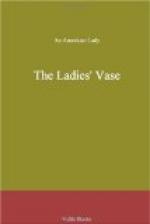Every character has beauties peculiar to itself, and dangers to which it is peculiarly exposed; and there are duties, pertaining to each, apart from the circumstances in which they may be placed. Nothing, therefore, can be more contrary to the manifest order and disposition of Providence, than to endeavor to be, or do, whatever we admire in another, or to force ourselves to be and do whatever we admire in ourselves. Which character, of the endless variety that surrounds us, is the most happy, the most useful, and most deserving to be beloved, it were impossible, I believe, to decide; and, if we could, we have gained little by the decision; for we could neither give it to our children, nor to ourselves. But of this we may be certain: that individual, of whatever intellectual character, is the happiest, the most useful, and the most beloved of God, if not of men, who has best subserved the purposes of Heaven in her creation and endowment; who has most carefully turned to good the faculties she has; most cautiously guarded against the evils to which her propensities incline; most justly estimated, and conscientiously fulfilled, the duties appropriate to her circumstance and character.
INFLUENCE OF CHRISTIANITY ON WOMAN.
The abject condition of the female sex, in all, out of Christian countries, is universally known and admitted. In all savage and pagan tribes, the severest burdens of physical toil are laid upon their shoulders; they are chiefly valued for the same reason that men value their most useful animals, or as objects of their sensual and selfish desires. Even in the learned and dignified forms of Eastern paganism, “the wife,” says one who has spent seventeen years among them, “is the slave, rather than the companion of her husband. She is not allowed to walk with him, she must walk behind him; not to eat with him, she must eat after him, and eat of what he leaves. She must not sleep until he is asleep, nor remain asleep after he is awake. If she is sitting, and he comes in, she should rise up. She should, say their sacred books, have no other god on earth than her husband. Him she should worship while he lives, and, when he dies, she should be burnt with him. As the widow, in case she is not burnt, is not allowed to marry again, is often considered little better than an outcast, and not unfrequently sinks into gross vice, her life can scarcely be considered a blessing.”
The same author remarks, that “there is little social intercourse between the sexes; little or no acquaintance of the parties before marriage, and consequently little mutual attachment; and as there is an absolute vacuity and darkness in the minds of the females, who are not allowed even to learn to read, there is no solid foundation laid for domestic happiness.”




